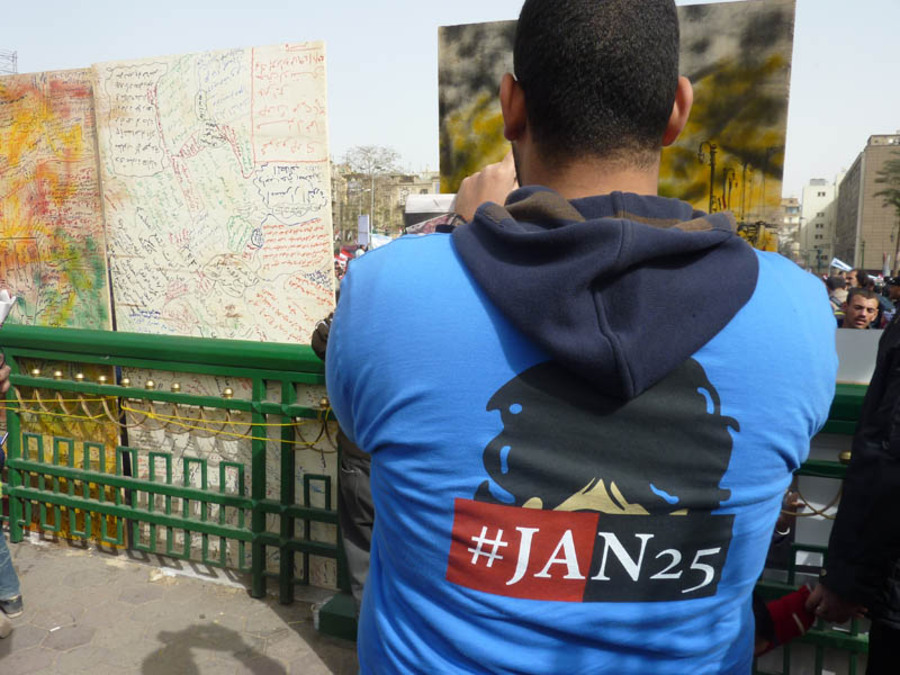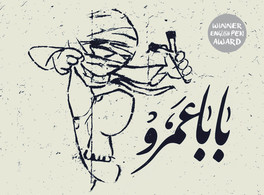Courses and Workshops
Index / Activities / Courses and Workshops / #ArabSpring four years later
#ArabSpring four years later
March 16, 2015From 9:30 a.m. to 7:00 p.m.
MADRID
Casa Árabe Auditorium (at Calle Alcalá, 62).
From 9:30 a.m. to 7:00 p.m.
FREE entry after registering.
In order to sign up, you must send an e-mail message to: confirmaciones@casaarabe.es
In English, with simultaneous translation into Spanish.
Seminar on “Citizen entrepreneurship, political participation and artistic expression among Arab youths.” You may now register.
Since the popular uprising that caught fire in Tunisia in December of 2010, the Arab world has never been the same again. The initial revolts were received with contagious enthusiasm, and as the dictators fell, the voices of the people, silenced for decades, took over the public sphere. The term “Arab Spring” was coined and embraced by both the media and observers, as well as its participants. The romantic reminiscence of 1968 Prague seemed to fill the air, though also its dramatic outcome.
Four years later, the scene is completely different and the Arab Spring’s spirit of renewal seems to have been overshadowed by a long and uncertain winter. Certain countries like Syria, Libya and Yemen have become entangled in disastrous civil wars. In Egypt, the transition towards a democratic government has been interrupted by deep political divisions, military intervention, an economy in crisis and dysfunctional state institutions. Although Tunisia seems to have escaped from the reigning polarization and is on a path towards a better future, it is still in a fragile socio-economic situation.
Despite the widespread feeling of despair, diverse role-players and groups continue to work from different realms in these countries to achieve a significant change in living conditions and create a chance for opportunities so as to attain the initial revolutionary goals of “bread, freedom and social justice.” Within this context, the story of “social entrepreneurship” is a process which must overcome many different obstacles. That story must be told. The wave of popular movements gave rise to citizen-based initiatives and even new companies that have breathed air into the region’s revolutions, and though unknown by most, they continue to be a phenomenon which will have important effects in terms of the development of these societies.
For instance, activists, businesspeople, artists, musicians and filmmakers have contributed to rebuilding the political, economic, social and cultural fabric, thereby reflecting a growing interest in cooperating with others on topics in the common interest. The development of plural systems, in which all political forces participate without one monopolizing power, is a difficult task in countries with a severe lack of democratic experience. However, they must start somewhere. The exercise in creating a new culture of debate and consensus can be achieved through expression and taking on risks, rejecting traditional social hierarchies and the government’s hegemony, unleashing hidden potential by breaking the bonds of fear.
This seminar, organized by Casa Árabe and the Friedrich Ebert Foundation, comes at a crucial time for reflecting upon and evaluating the tellurian movements that have shaken the foundations of the MENA region and will set the tone for their future development.
When the seminar ends, the show “Syria Speaks” will be held. Paid tickets are required to attend the show but not the seminar and are on sale now online.
Four years later, the scene is completely different and the Arab Spring’s spirit of renewal seems to have been overshadowed by a long and uncertain winter. Certain countries like Syria, Libya and Yemen have become entangled in disastrous civil wars. In Egypt, the transition towards a democratic government has been interrupted by deep political divisions, military intervention, an economy in crisis and dysfunctional state institutions. Although Tunisia seems to have escaped from the reigning polarization and is on a path towards a better future, it is still in a fragile socio-economic situation.
Despite the widespread feeling of despair, diverse role-players and groups continue to work from different realms in these countries to achieve a significant change in living conditions and create a chance for opportunities so as to attain the initial revolutionary goals of “bread, freedom and social justice.” Within this context, the story of “social entrepreneurship” is a process which must overcome many different obstacles. That story must be told. The wave of popular movements gave rise to citizen-based initiatives and even new companies that have breathed air into the region’s revolutions, and though unknown by most, they continue to be a phenomenon which will have important effects in terms of the development of these societies.
For instance, activists, businesspeople, artists, musicians and filmmakers have contributed to rebuilding the political, economic, social and cultural fabric, thereby reflecting a growing interest in cooperating with others on topics in the common interest. The development of plural systems, in which all political forces participate without one monopolizing power, is a difficult task in countries with a severe lack of democratic experience. However, they must start somewhere. The exercise in creating a new culture of debate and consensus can be achieved through expression and taking on risks, rejecting traditional social hierarchies and the government’s hegemony, unleashing hidden potential by breaking the bonds of fear.
This seminar, organized by Casa Árabe and the Friedrich Ebert Foundation, comes at a crucial time for reflecting upon and evaluating the tellurian movements that have shaken the foundations of the MENA region and will set the tone for their future development.
When the seminar ends, the show “Syria Speaks” will be held. Paid tickets are required to attend the show but not the seminar and are on sale now online.
9:30 OPENING CEREMONY
Welcoming given by the event’s organizers
Michael Ehrke, director of the Madrid office, Friedrich Ebert Stiftung
Eduardo López Busquets, General Director of Casa Árabe
OPENING SPEECH
The people’s entrepreneurial spirit and the future of the Arab Spring. Maryam Jamshidi, lawyer and political scientist, Muftah.org
10:00-11:30 a.m. SESSION 1: PARTICIPATION AND POLITICAL DIALOGUE
“New forms of participation and objection.” Zied Boussen, member of Jeunes Démocrates Indépendants (Tunisia).
“Religious and political movements.” Nader Hashemi, director of the Center for Middle East Studies and an associate professor of Islamic and Middle Eastern Politics at the Josef Korbel School of International Studies, University of Denver.
“The fourth and decisive branch of power: the media.” Fátima El-Issawi, a researcher at the Middle East Centre of the London School of Economics
The event will be presented and moderated by Karim Hauser, who is responsible for the Governance Area at Casa Árabe.
11:30 a.m.-12:00 p.m. COFFEE BREAK
12:00-1:30 p.m. SESSION 2: PROJECTS AND ECONOMIC INITIATIVES
“The businesspeople of the revolution.” Samir Karam, entrepreneur and founder of Startup Megaphone
“Creating jobs amid the crisis.” Youssef Fennira, project leader, Tunisian-German Chamber of Commerce and Industry
“The State’s fragmented economies and society.” Adil Sadoq, an expert on microfinance and field project manager, Mennonite Economic Development Associates (MEDA)
Moderated by: Olivia Orozco, Casa Árabe’s Training, Economics and Governance Coordinator
1:30-3:00 p.m. LUNCH BREAK
3:00-4:30 p.m. SESSION 3: MOVEMENTS AND SOCIAL DYNAMICS
“The importance of discontent: Arab faces and perceptions of injustice.” Middle East Center, associate researcher, Carnegie-Middle East Center
“Activism and human rights.” Mohammed al Maskati, consultant and defender of Human Rights, The Bahrain Youth Society for Human Rights
“Mental health in countries affected by conflicts.” Sally Toma, psychologist, therapist and activist. Kazeboon
Moderated by: Leila Nachawati, a professor of Communication at the Universidad Carlos III and co-founder of the portal Syria Untold
4:30-5:00 p.m. COFFEE BREAK
5:00-6:30 p.m. SESSION 4: ARTISTIC EXPRESSION AND CULTURAL MANIFESTATIONS
“Creativity and spaces for freedom.” Malu Halasa, writer and editor of the book “Syria Speaks”
“The walls speak: art in the streets.” Anahi Alviso, a researcher at the Centre Français d’Archéologie et de Sciences Sociales de Sanaa (CEFAS)
“People’s theater and collective memory.” Jaouad Essounani, director of the company Dabateatr
Moderated by: Nuria Medina, Coordinator of Culture and New Media, Casa Árabe
6:30 p.m. CLOSING SESSION
Welcoming given by the event’s organizers
Michael Ehrke, director of the Madrid office, Friedrich Ebert Stiftung
Eduardo López Busquets, General Director of Casa Árabe
OPENING SPEECH
The people’s entrepreneurial spirit and the future of the Arab Spring. Maryam Jamshidi, lawyer and political scientist, Muftah.org
10:00-11:30 a.m. SESSION 1: PARTICIPATION AND POLITICAL DIALOGUE
“New forms of participation and objection.” Zied Boussen, member of Jeunes Démocrates Indépendants (Tunisia).
“Religious and political movements.” Nader Hashemi, director of the Center for Middle East Studies and an associate professor of Islamic and Middle Eastern Politics at the Josef Korbel School of International Studies, University of Denver.
“The fourth and decisive branch of power: the media.” Fátima El-Issawi, a researcher at the Middle East Centre of the London School of Economics
The event will be presented and moderated by Karim Hauser, who is responsible for the Governance Area at Casa Árabe.
11:30 a.m.-12:00 p.m. COFFEE BREAK
12:00-1:30 p.m. SESSION 2: PROJECTS AND ECONOMIC INITIATIVES
“The businesspeople of the revolution.” Samir Karam, entrepreneur and founder of Startup Megaphone
“Creating jobs amid the crisis.” Youssef Fennira, project leader, Tunisian-German Chamber of Commerce and Industry
“The State’s fragmented economies and society.” Adil Sadoq, an expert on microfinance and field project manager, Mennonite Economic Development Associates (MEDA)
Moderated by: Olivia Orozco, Casa Árabe’s Training, Economics and Governance Coordinator
1:30-3:00 p.m. LUNCH BREAK
3:00-4:30 p.m. SESSION 3: MOVEMENTS AND SOCIAL DYNAMICS
“The importance of discontent: Arab faces and perceptions of injustice.” Middle East Center, associate researcher, Carnegie-Middle East Center
“Activism and human rights.” Mohammed al Maskati, consultant and defender of Human Rights, The Bahrain Youth Society for Human Rights
“Mental health in countries affected by conflicts.” Sally Toma, psychologist, therapist and activist. Kazeboon
Moderated by: Leila Nachawati, a professor of Communication at the Universidad Carlos III and co-founder of the portal Syria Untold
4:30-5:00 p.m. COFFEE BREAK
5:00-6:30 p.m. SESSION 4: ARTISTIC EXPRESSION AND CULTURAL MANIFESTATIONS
“Creativity and spaces for freedom.” Malu Halasa, writer and editor of the book “Syria Speaks”
“The walls speak: art in the streets.” Anahi Alviso, a researcher at the Centre Français d’Archéologie et de Sciences Sociales de Sanaa (CEFAS)
“People’s theater and collective memory.” Jaouad Essounani, director of the company Dabateatr
Moderated by: Nuria Medina, Coordinator of Culture and New Media, Casa Árabe
6:30 p.m. CLOSING SESSION


